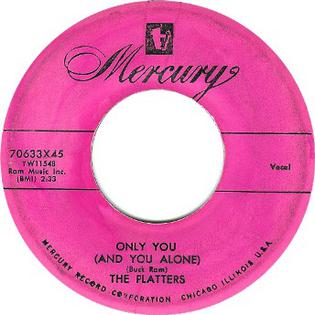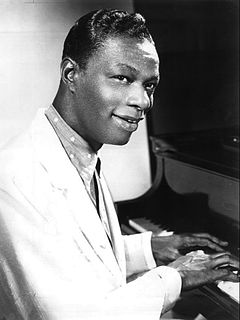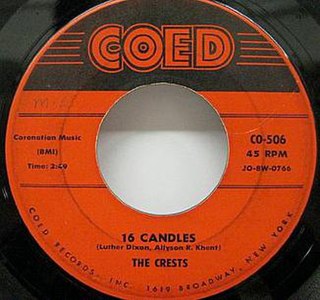The Billboard Hot 100 is the music industry standard record chart in the United States for songs, published weekly by Billboard magazine. Chart rankings are based on sales, radio play, and online streaming in the United States.
The Billboard 200 is a record chart ranking the 200 most popular music albums and EPs in the United States. It is published weekly by Billboard magazine. It is frequently used to convey the popularity of an artist or groups of artists. Often, a recording act will be remembered by its "number ones", those of their albums that outperformed all others during at least one week. The chart grew from a weekly top 10 list in 1956 to become a top 200 in May 1967, and acquired its present title in March 1992. Its previous names include the Billboard Top LPs (1961–72), Billboard Top LPs & Tape (1972–84), Billboard Top 200 Albums (1984–85) and Billboard Top Pop Albums.
"The Wonder of You" is a song written by Baker Knight first released by Ray Peterson in 1959. Elvis Presley had a no. 1 hit in the UK and a Top 10 hit in the U.S. with his 1970 live version.

"Only You " is a pop song composed by Buck Ram. It was originally recorded by The Platters with lead vocals by Tony Williams in 1955.
Bubbling Under Hot 100 Singles is a chart published weekly by Billboard magazine in the United States. The chart lists the top songs that have not yet charted on the main Billboard Hot 100. Chart rankings are based on radio airplay, sales and streams. In its initial years, the chart listed 15 positions, but expanded to as many as 36 during the 1960s, particularly during years when over 700 singles made the Billboard Hot 100 chart. From 1974 to 1985, the chart consisted of 10 positions; since 1992, the Bubbling Under Hot 100 Singles chart has listed 25 positions.
Billboard Year-End charts are a cumulative measure of a single or album's performance in the United States, based upon the Billboard magazine charts during any given chart year. Billboard's "chart year" runs from the first Billboard "week" of December to the final week in November, but because the Billboard week is dated in advance of publication, the last calendar week for which sales are counted is usually the third week in November. This altered calendar allows for Billboard to calculate year-end charts and release them in time for its final print issue in the last week of December. Prior to incorporating chart data from Nielsen SoundScan, year-end charts were calculated by an inverse-point system based solely on a title's performance. Other factors including the total weeks a song spent on the chart and at its peak position were calculated into its year-end total. The same method was used for albums based on the Billboard 200, and songs appearing on the other charts.

"The Twist" is an American pop song written and originally released in early 1959 by Hank Ballard and the Midnighters as a B-side to "Teardrops on Your Letter". Ballard's version was a moderate 1960 hit, peaking at number 28 on the Billboard Hot 100.

"Venus" is a song written by Ed Marshall and Peter DeAngelis. The most successful and best-known recording of the track was done by Frankie Avalon and released in 1959, where it reached the top of the Billboard Hot 100.

"The Battle of New Orleans" is a song written by Jimmy Driftwood. The song describes the Battle of New Orleans from the perspective of an American soldier; the song tells the tale of the battle with a light tone and provides a rather comical version of what actually happened at the battle. It has been recorded by many artists, but the singer most often associated with this song is Johnny Horton. His version scored number 1 on the Billboard Hot 100 in 1959. Billboard ranked it as the No. 1 song for 1959, it was very popular with teenagers in the late 50s/early 60s in an era mostly dominated by rock and roll music.
"I Only Have Eyes for You" is a romantic love song by composer Harry Warren and lyricist Al Dubin, written for the film Dames (1934) where it was introduced by Dick Powell and Ruby Keeler. The song is a jazz standard, and has been covered by numerous musicians. Successful recordings of the song have been made by Ben Selvin, Peggy Lee, The Lettermen, Art Garfunkel, The Three Degrees, and Rod Stewart, among others. Perhaps the best known and most acclaimed version is the "otherworldly" 1959 recording by doo-wop artists The Flamingos, which was inducted into the Grammy Hall of Fame in 2003, and listed as #157 in Rolling Stone magazine's "500 Greatest Songs of All Time (2004)."

"Why" is a hit song recorded by Frankie Avalon in 1959 that went to No. 1 on the U.S. Billboard Hot 100 chart published on the week of December 28, 1959, for the week ending of January 2, 1960, making it the last No. 1 single of the 1950s, and the first No. 1 single of the 1960s at the same time. It also became the first No. 1 single of the 1960s on the Cashbox magazine charts. The song was written by Avalon's manager and record producer Robert "Bob" Marcucci and Peter De Angelis. It was Avalon's second and final No. 1 hit.
"Living Doll" is a song written by Lionel Bart made popular by Cliff Richard and the Shadows in 1959. It was the top selling single in the UK in 1959. It has topped the UK charts twice: in its original version in 1959 and a new version recorded in 1986 in aid of Comic Relief.

"Mona Lisa" is a popular song written by Ray Evans and Jay Livingston for the Paramount Pictures film Captain Carey, U.S.A. (1950). The title and lyrics refer to the renaissance portrait Mona Lisa painted by Leonardo da Vinci. The song won the Academy Award for Best Original Song in 1950.

"16 Candles" is a 1958 song performed by The Crests and written by Luther Dixon and Allyson R. Khent.
"Peter Gunn" is the theme music composed by Henry Mancini for the television show of the same name. The song was the opening track on the original soundtrack album, The Music from Peter Gunn, released in 1959. Mancini won an Emmy Award and two Grammys for Album of the Year and Best Arrangement.
This is a list of Billboard magazine's Top Hot 100 songs of 1959.






